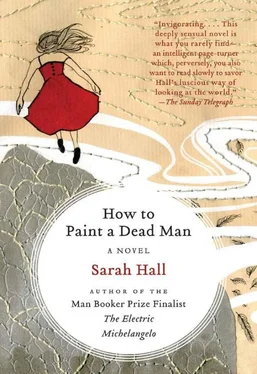Sarah Hall - How to Paint a Dead Man
Здесь есть возможность читать онлайн «Sarah Hall - How to Paint a Dead Man» весь текст электронной книги совершенно бесплатно (целиком полную версию без сокращений). В некоторых случаях можно слушать аудио, скачать через торрент в формате fb2 и присутствует краткое содержание. Год выпуска: 2009, Издательство: Harper Perennial, Жанр: Современная проза, на английском языке. Описание произведения, (предисловие) а так же отзывы посетителей доступны на портале библиотеки ЛибКат.
- Название:How to Paint a Dead Man
- Автор:
- Издательство:Harper Perennial
- Жанр:
- Год:2009
- ISBN:нет данных
- Рейтинг книги:4 / 5. Голосов: 1
-
Избранное:Добавить в избранное
- Отзывы:
-
Ваша оценка:
- 80
- 1
- 2
- 3
- 4
- 5
How to Paint a Dead Man: краткое содержание, описание и аннотация
Предлагаем к чтению аннотацию, описание, краткое содержание или предисловие (зависит от того, что написал сам автор книги «How to Paint a Dead Man»). Если вы не нашли необходимую информацию о книге — напишите в комментариях, мы постараемся отыскать её.
, Sarah Hall, "one of the most significant and exciting of Britain's young novelists" (
), delivers "a maddeningly enticing read... an amazing feat of literary engineering" (
).
How to Paint a Dead Man — читать онлайн бесплатно полную книгу (весь текст) целиком
Ниже представлен текст книги, разбитый по страницам. Система сохранения места последней прочитанной страницы, позволяет с удобством читать онлайн бесплатно книгу «How to Paint a Dead Man», без необходимости каждый раз заново искать на чём Вы остановились. Поставьте закладку, и сможете в любой момент перейти на страницу, на которой закончили чтение.
Интервал:
Закладка:
‘It’s Netta. Is the television still on?’ She hears scuffling on the tiles, as if he is standing up.
‘No. Yes. It’s off now. It’s OK. Go back to sleep, quickly.’ His voice is hoarse, as if he is getting Tommaso’s cold. ‘Good night.’
‘Good night.’ As Annette makes her way back to bed, she hears, perhaps, though she cannot be sure, a very faint wail, as if a night creature, flying from roof to roof in the town, is calling to another of its kind.
In the cool back room of Castrabecco the following morning, Annette prepares the cuttings. She binds them with twine and loads them into the back of the flower van. Mauri does not say much as they drive through the old walled town. ‘I have things on my mind,’ he tells her when she asks if he is feeling unwell. ‘I have personal matters to contend with. I have inner conflicts. You are a girl. You would not understand.’ She wonders if Mauri is in love. Perhaps he is thinking of joining the army, as he did once before, when Vincenzo left for Argentina. It made their mother furious. At the citadel, he forgets the lug of the wing mirror and it cracks back against the side of the van. She hears a telltale chink as the glass cracks. Her brother curses and punches the steering wheel. Annette flinches. He drops her at the pitch, puts up the canvas stall without ceremony or performance, and then leaves without kissing her cheek. There are no jokes about killing their mother or joining the Foreign Legion. There is no teasing about adoration unrequited or his virility. Perhaps it is Maria from the cinema, Annette thinks, who all the young men are passionate about, or Romana who works at the information cubicle of Civitella, who has notorious flaming hair like the mistress of the mayor.
In the hot sun the flowers begin their mysterious olfactory elicitation. ‘Buy us, buy us, for reasons of marriage or seduction.’ There is the usual bustle and weekend gossip. Elemme tells her there is a new antique stall set up in the market to attract the tourists. It sells clocks, angels made from bent coins, old postcards, photographs and glassware. In old crates are religious wooden icons distressed to look ancient. ‘Most of it is junk,’ says Elemme. ‘Not worth spit. Just rope and springs. But everyone is over there looking for ceramics and Venetian goblets. I’m bored. Do you want some Coca-Cola?’ Her castanet shoes click quickly down the stalls, her heels slipping in and out of the leather hulls as she goes, and the beads in her hair tick-tack. Annette pictures all the people walking past, sipping coffee or eating porchetta , carrying baskets, pausing to fix a stocking, scoring a line through a list.
As she waits, she wonders about the new television set. She wonders about its productions and what happens when it is turned off. Programmes are still being fed into it, but what does it do with them? Uncle Marcello says the device is simply a magic box of light and signals, a shrunken cinema in which people might act, but she can’t help imagining all the people it contains lying down to sleep when it is turned off, or going on with their lives in privacy. Perhaps this was the case last night, when she was woken. But do they know that they are being watched? Are they oblivious to their capture and their shrunken size, or do they know they are captives, that it is their duty to jump up and act whenever the silver switch is pressed and the tuning wheel turned? Do they take their cues by walking up to chalk marks scored on the television floor, like school children in the religious plays? And if they are unaware, do they still feel the gaze of people watching them, like an intuition, as she feels the leer of the Bestia?
A breeze passes, bringing with it the scent of peach and pork fat. A woman stops to buy a little posy for a sick friend. The friend has had a hysterectomy, the curse of eight deliveries, the woman says. Not that she agrees with the doctors overseas, practising termination-bless the poor babies. Annette is distracted, she does not follow the conversation. She knows her mother would not approve of such rumination over the television set. She would consider it a vexing realm for Annette to have strayed into. She would prefer it instead if Annette contemplated Good Works. When the two of them become engaged in difficult conversations often she has wondered whether Annette might be better suited in a convent, where life is simple and virtuous and repetitious. ‘You are walking into a maze, daughter,’ her mother has often said. ‘Just how do you think you will get out? Where are you trying to go with this?’ And yet Annette cannot help but think how she thinks, the world being as full of puzzles as it is.
Perhaps the people inside the television might hate being looked in upon, as her mother despises pedestrians in the street casually glancing into the lower rooms of Castrabecco. Perhaps the television dwellers fear the moment when the silver button is pressed to the OFF position, because they will be left in complete darkness, knocking on the walls of the television and bumping into each other, banging foreheads and stumbling over each other’s feet. They will be locked up inside the bubble with all the creatures and crimes of the television’s world, and the whole roaring Pacific.
Her head begins to ache a little. This is the real problem. What if the people in the television were watching other people on television, who were in turn watching televisions? How many television worlds could there be? Could the worlds of television be endless, like the windows in the Dutch paintings, revealing places with yet more windows? Could there be a long glass hole in the universe consisting entirely of television screens?
Elemme returns with the Coca-Colas, which are so cold she cannot hold the bottles. ‘Quick, take it! My fingers are stuck!’ The two drink their drinks under the flower-stall awning. Sweetness explodes in Annette’s mouth, it fizzes and stings her sinuses. Elemme pats Annette on the shoulder. ‘Listen, we should untie your hair. It’s so pretty. It’s a shame always to have it in braids or hidden under a scarf. Here. I’ll arrange it for you.’ She unties the fastenings and gently begins to unravel the long, crimped strands. ‘Do you have a television at home?’ Annette asks as she has her hair combed. Elemme grunts. ‘No, angel, we cannot afford it. And if we could I would prefer a dishwasher. That would be the very best thing. There are too many men renting our house. Not one of them knows how to turn on the kitchen tap.’ She tucks a strand of hair behind Annette’s ear. ‘There! Tomorrow I will bring a little conditioning oil and we’ll shine it. Maybe I’ll even open a styling shop, since no one is buying my buttons.’
As Annette finishes her cola, she imagines herself trapped in the static factory of the television. Inside it is not like a womb. It is not like a wardrobe. It is claustrophobic, even though Annette is shrunken. It smells of nothing, or perhaps it smells of singed flex and burning dust, like the iron when it gets too hot. She gropes for a trapdoor, a window, or a loose seam, but there is no way out. If Elemme were inside a television set she would surely be able to find a doorway or a plastic chute next to the wires at the back, and open it, and slip out. She would immediately know where she was and how to get her bearings. She is practical like that. In the un-drying paint of the Deposition, the Bestia also knows how to work the release mechanism. He pours out of the composition and emerges bright and terrible, his horror bleeding everywhere.
The most frightening thought of all is that she, Annette, would not even realise her position if she were stuck in the oubliette of the television, and then she would be forgotten. She would not be the real Annette. Once this thought has occurred to her, she finds it very hard to cast aside.
Читать дальшеИнтервал:
Закладка:
Похожие книги на «How to Paint a Dead Man»
Представляем Вашему вниманию похожие книги на «How to Paint a Dead Man» списком для выбора. Мы отобрали схожую по названию и смыслу литературу в надежде предоставить читателям больше вариантов отыскать новые, интересные, ещё непрочитанные произведения.
Обсуждение, отзывы о книге «How to Paint a Dead Man» и просто собственные мнения читателей. Оставьте ваши комментарии, напишите, что Вы думаете о произведении, его смысле или главных героях. Укажите что конкретно понравилось, а что нет, и почему Вы так считаете.












